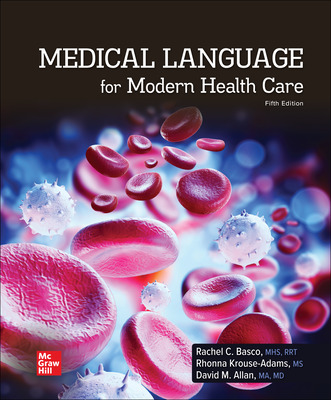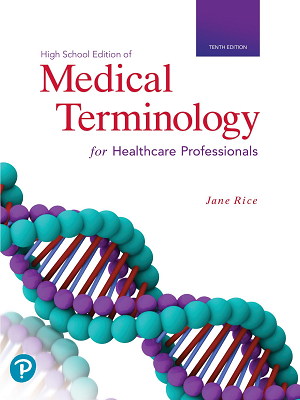Health Science | Medical Terminology
Review: 7 Popular Medical Terminology Textbooks for 2024
Coming from a family of educators, Brad knows both the joys and challenges of teaching well. Through his own teaching background, he’s experienced both firsthand. As a writer for iCEV, Brad’s goal is to help teachers empower their students by listening to educators’ concerns and creating content that answers their most pressing questions about career and technical education.
Medical terminology is an essential subject for every health science student.
To work in any healthcare career, your students need to understand and properly use terms related to the human body and the industry.
On top of that, medical terminology is a fundamental part of every health science certification!
So when it comes to teaching such a critical topic to your students, you want a great resource to support your curriculum.
With so many options out there, how do you know which one is the best?
The seven most popular medical terminology textbooks (in no particular order) are:
- Basic Medical Language
- Medical Language for Modern Health Care
- Mastering Healthcare Terminology
- Medical Terminology Complete!
- Medical Terminology: Get Connected!
- Medical Terminology for Health Care Professionals
- Medical Terminology: A Living Language
In this blog, you’ll learn the details of each textbook and some ideas on the type of course where they work best.
1. Basic Medical Language
- Authors: Danielle LaFleur Brooks, Myrna LaFleur Brooks, and Dale Levinsky
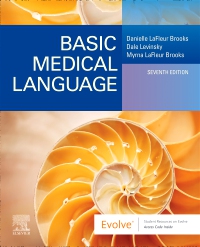
- Published: 2024
- Retail Price: $65
The seventh edition of Basic Medical Language is designed to introduce students to fundamental medical vocabulary.
The book focuses on suffixes, prefixes, and their combinations to help students learn hundreds of medical terms they will need to know for a career in healthcare.
Plus, these lessons help students identify and understand new terms they may encounter on the job.
Basic Medical Language is organized into twelve chapters:
- Introduction to Medical Language, Body Structure, and Oncology
- Directional Terms, Planes, Regions, Positions, and Quadrants
- Integumentary System, Colors, and Plural Endings
- Respiratory System
- Urinary System
- Reproductive Systems
- Cardiovascular and Lymphatic Systems
- Digestive System
- Eye and Ear
- Musculoskeletal System
- Nervous System
- Endocrine System
Each chapter includes key objectives, related images, learning exercises, and case studies to help students learn new terms and understand the context of when each one should be used.
In addition, this textbook comes with more than 200 flashcards to help students memorize medical terms.
Overall, any teacher looking for an introductory medical terminology book will find this text useful.
However, if you need a textbook that will work for a full-year medical terminology course, Basic Medical Language may not go into enough depth for your needs.
2. Medical Language for Modern Health Care
- Authors: David Allan and Rachel Basco
- Published: 2023
- Retail Price: $107 Loose-Leaf, $138 Hardcopy
Medical Language for Modern Health Care teaches medical terminology by using contextual-based learning and an organized approach to each topic.
In this book, you’ll find 22 chapters on healthcare terminology:
- The Anatomy of Medical Terms
- Word Analysis and Communication
- The Body as a Whole
- Integumentary System
- Digestive System
- Urinary System
- Male Reproductive System
- Female Reproductive System
- Nervous System
- Cardiovascular System
- Blood
- Lymphatic and Immune System
- Respiratory System
- Skeletal System
- Muscles, Tendons, Physical Medicine, and Rehabilitation
- Special Senses of the Eye and Ear
- Endocrine System
- Mental Health
- Geriatrics
- Cancer
- Radiology and Nuclear Medicine
- Pharmacology
What’s great about Medical Language for Modern Health Care is the level of detail included in each chapter.
You’ll find a focused approach that includes the context for each term, along with exercises to reinforce student understanding.
By segmenting each chapter at such a detailed level, students will learn hundreds of medical terms in specific contexts every time you start a new chapter.
If you’re looking for an in-depth medical terminology textbook that covers more than the basics, this one could be a great fit!
3. Mastering Healthcare Terminology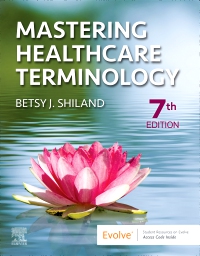
- Author: Betsy J. Shiland
- Published: 2023
- Retail Price: $95
Mastering Healthcare Terminology is designed to help medical professionals learn medical terms and definitions in order to effectively communicate in the field.
The book includes 16 chapters, which are organized into three sections:
- Basic Terminology
- Body System Terminology
- Specialty Terminology
Basic Terminology includes the first two chapters of the book. It introduces students to basic healthcare terminology and discusses the structure of the human body.
Body Systems contains 12 chapters focused on the nitty-gritty of medical terms associated with each body system. This is the most detailed portion of the book, and you may use it for the bulk of your lessons.
Specialty Terminology is made up of the final two chapters, which discuss medical terms in relation to behavioral health and oncology.
In addition, you'll find dozens of case studies and examples throughout the book that provide real-world context to students as they learn different terms.
The textbook also includes practice quizzes, flash cards, and more that students can use to study for exams throughout your course.
Overall, Mastering Healthcare Terminology is noted as a good resource for advanced high school classes, college-level classes, or refreshing healthcare professionals.
However, that means if you teach introductory high school medical terminology, this book may be too advanced for your courses.
4. Medical Terminology Complete!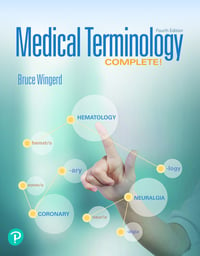
- Author: Bruce Wingerd
- Published: 2019
- Retail Price: $112
The Medical Terminology Complete! textbook teaches students key healthcare terminology with a major focus on terms used in hospitals and clinics.
The book is made up of 15 chapters:
- Introduction to Word Parts and Word Construction
- Understanding Suffixes
- Understanding Prefixes
- The Human Body in Health and Disease
- The Integumentary System
- The Skeletal and Muscular Systems
- Blood, the Lymphatic System, and Immunology
- The Cardiovascular System
- The Respiratory System
- The Digestive System
- The Urinary System
- Reproductive System and Obstetrics
- The Nervous System and Mental Health
- The Special Senses of Sight and Hearing
- The Endocrine System
Each chapter introduces key terms related to the body systems and clinical designations.
This book presents all of its terms and definitions in the context of clinical setting, as opposed to a laboratory or biological setting.
These two aspects make Medical Terminology Complete! a great choice for a high school medical terminology course.
However, because this book was published in 2016, some of the information will be dated (such as using the term “mental health” instead of “behavioral health”).
That doesn’t mean the whole book is irrelevant. But if you purchase Medical Terminology Complete!, it’s smart to review everything prior to starting your lessons!
5. Medical Terminology: Get Connected!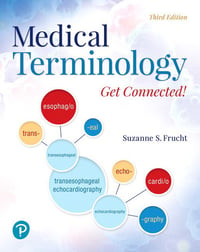
- Author: Suzanne S. Frucht
- Published: 2020
- Retail Price: $96
Medical Terminology: Get Connected! teaches medical terminology with a focus on using word parts and roots to build medical terms.
The text includes two sections that contain 17 chapters:
- Basic Word Building
- Medical Specialties
Basic Word Building teaches the foundations of medical terms like suffixes, prefixes, and anatomical terminology.
These chapters build the foundational knowledge students need in order to understand the information in the second section.
Medical Specialties contains chapters focused on each body system, such as integumentary, cardiovascular, and respiratory.
These chapters are organized in a step-by-step method to show students word parts, then word roots, and eventually word assembly related to each system.
Each chapter also includes a variety of exercises and review activities to help students practice and apply what they’ve learned.
If you’re looking for a textbook that teaches students how to contextualize and understand any medical term they encounter, Medical Terminology: Get Connected! is right up your alley.
6. Medical Terminology for Health Care Professionals
- Author: Jane Rice
- Published: 2021
- Retail Price: $75
Medical Terminology for Health Care Professionals takes a systematic approach to teaching medical terms in relation to specific healthcare careers.
The book opens with introductory healthcare terms and then transitions into terminology associated with healthcare fields like behavioral health, and special patient considerations.
In total, this textbook has 18 chapters:
- Introduction to Medical Terminology
- Suffixes and Prefixes
- Organization of the Body
- Integumentary System
- Skeletal System
- Muscular System
- Digestive System
- Cardiovascular System
- Blood and Lymphatic System
- Respiratory System
- Urinary System
- Endocrine System
- Nervous System
- Special Senses: The Ear
- Special Senses: The Eye
- Female Reproductive System with an Overview of Obstetrics
- Male Reproductive System
- Mental Health
Each chapter within Medical Terminology for Health Care Professionals uses a system to help students understand word parts and how to build medical terms.
In addition, the text includes information related to pharmaceuticals, diagnostics, lab testing, and more.
This helps students learn the basics of medical terminology, plus applicable knowledge in more career-specific areas.
Overall, if you’re looking for a detailed book that relates basic medical terminology to specific careers in healthcare, Medical Terminology for Health Care Professionals could be it!
If you teach more of an introductory course, or only spend part of your semester discussing medical terms, this book could be too detailed for your needs.
The only downside of this book is the use outdated terms such as “mental health” as opposed to “behavioral health.” Make sure you keep an eye out for other potential cases of outdated terminology if you choose it!
7. Medical Terminology: A Living Language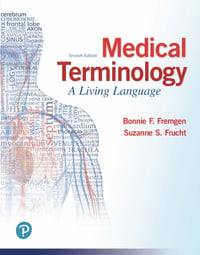
- Authors: Bonnie F. Fremgen and Suzanne S. Frucht
- Published: 2019
- Retail Price: $117
Medical Terminology: A Living Language teaches students about medical terms through real-world examples related to basic anatomy and physiology.
This textbook is organized into 13 parts:
- Introduction to Medical Terminology
- Body Organization
- Integumentary System
- Musculoskeletal System
- Cardiovascular System
- Blood and the Lymphatic and Immune Systems
- Respiratory System
- Digestive System
- Urinary System
- Reproductive System
- Endocrine System
- Nervous System
- Special Senses: The Eye and Ear
Each part is organized with the same topics in the same order: learning objectives, anatomy, terminology, pathology, diagnostic procedures, therapeutic procedures, and more.
Each chapter also ends with reviews and practice exercises to help students learn the real-world applications of the concepts and terms.
The textbook is organized this way to teach students the applications of medical terms as opposed to memorizing them for the sake of a test.
Overall, Medical Terminology: A Living Language could be a great addition to any medical terminology course!
Which Medical Terminology Textbook Is Right for You?
Though it’s not possible to review every medical terminology textbook out there, these are seven of the best!
As you learn more about each option, keep in mind that traditional textbooks aren’t the only viable instructional materials to teach medical terminology.
In fact, some health science instructors have found that digital curriculum can make a huge difference in their students’ understanding of medical terms, healthcare knowledge, and preparation for certifications.
Curious if digital curriculum will be a better fit for you and your students?
Click below to get your free comparison guide for digital curriculum vs. textbooks!


